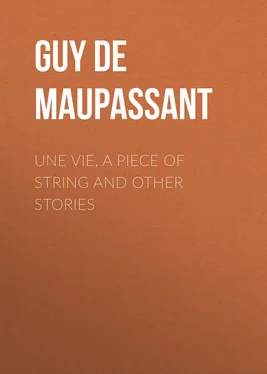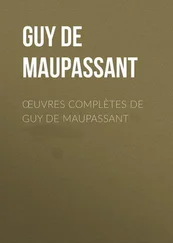Guy Maupassant - Une Vie, a Piece of String and Other Stories
Здесь есть возможность читать онлайн «Guy Maupassant - Une Vie, a Piece of String and Other Stories» — ознакомительный отрывок электронной книги совершенно бесплатно, а после прочтения отрывка купить полную версию. В некоторых случаях можно слушать аудио, скачать через торрент в формате fb2 и присутствует краткое содержание. Жанр: literature_19, foreign_antique, foreign_prose, на английском языке. Описание произведения, (предисловие) а так же отзывы посетителей доступны на портале библиотеки ЛибКат.
- Название:Une Vie, a Piece of String and Other Stories
- Автор:
- Жанр:
- Год:неизвестен
- ISBN:нет данных
- Рейтинг книги:5 / 5. Голосов: 1
-
Избранное:Добавить в избранное
- Отзывы:
-
Ваша оценка:
- 100
- 1
- 2
- 3
- 4
- 5
Une Vie, a Piece of String and Other Stories: краткое содержание, описание и аннотация
Предлагаем к чтению аннотацию, описание, краткое содержание или предисловие (зависит от того, что написал сам автор книги «Une Vie, a Piece of String and Other Stories»). Если вы не нашли необходимую информацию о книге — напишите в комментариях, мы постараемся отыскать её.
Une Vie, a Piece of String and Other Stories — читать онлайн ознакомительный отрывок
Ниже представлен текст книги, разбитый по страницам. Система сохранения места последней прочитанной страницы, позволяет с удобством читать онлайн бесплатно книгу «Une Vie, a Piece of String and Other Stories», без необходимости каждый раз заново искать на чём Вы остановились. Поставьте закладку, и сможете в любой момент перейти на страницу, на которой закончили чтение.
Интервал:
Закладка:
Maupassant's pity now takes a pathetic turn. He no longer despises, but holds out his hand to those unfortunates who, like himself, are tormented on the pathway without hope. The tears that he sees flow make him sad, and his heart bleeds at all the wounds he discovers. He does not inquire into the quality or origin of the misfortune. He sympathizes with all suffering; physical suffering, moral suffering, the suffering caused by treachery, the bitter twilight of wasted lives…
His mind has also become active. He desires to dabble in science. One day he studies the Arab mystics, Oriental legends, and the next, he studies the marine fauna, etc. His perceptions have never been so clear. His brain is in continual activity. "It is strange," he acknowledges, "what a different man I am becoming mentally from what I was formerly. I can see it as I watch myself thinking, discovering, and developing stories, weighing and analyzing the imaginary beings that float through my imagination. I take the same enjoyment in certain dreams, certain exaltations of mind, as I formerly took in rowing like mad in the sunlight."
For the first time, his assurance as a writer wavers. As his last volumes show, he is endeavoring to transform, to renew himself. He acquires a desire to learn the secrets of obscure and precious hearts, to visit unknown races. He has lost his magnificent serenity…
As his malady began to take a more definite form, he turned his steps towards the south, only visiting Paris to see his physicians and publishers. In the old port of Antibes beyond the causeway of Cannes, his yacht, Bel Ami, which he cherished as a brother, lay at anchor and awaited him. He took it to the white cities of the Genoese Gulf, towards the palm trees of Hyères, or the red bay trees of Anthéor.
It was during one of these idle cruises on the open sea, outside of Agay and Saint-Raphael that he wrote "Sur l'Eau."
It was on the sacred sea of the old poets and philosophers, on the sea whose voice has rocked the thought of the world, that he cast into the shadow that long lament, so heartrending and sublime, that posterity will long shudder at the remembrance of it. The bitter strophes of this lament seem to be cadenced by the Mediterranean itself and to be in rhythm, like its melopoeia.
"Sur l'Eau" is the last Will and Testament, the general confession of Maupassant. To those who come after him he leaves the legacy of his highest thought; then he says farewell to all that he loved, to dreams, to starlit nights, and to the breath of roses. "Sur l'Eau" is the book of modern disenchantment, the faithful mirror of the latest pessimism. The journal written on board ship, disconnected and hasty, but so noble in its disorder, has taken a place forever beside Werther and René, Manfred and Oberman.
He had for a long time, to his sorrow, seen his health failing under the attacks of an obscure malady which left him with a sense of the diminution of his powers and a gradual clouding of his intellect.
Symptoms of general paralysis set in, at first mistaken for neurotic disturbances. He changed greatly. Those who met him as I did, thin and shivering, on that rainy Sunday when they were celebrating the inauguration of Flaubert's monument at Rouen would scarcely have recognized him. I shall never forget, as long as I live, his face wasted by suffering, his large eyes with a distressed expression, which emitted dying gleams of protest against a cruel fate…
Maupassant retired to Cannes not far from his mother. He read medical books and, in spite of what they taught, persisted in attributing his sufferings to "rheumatism localized in the brain," contracted amid the fogs on the Seine…
Vainly he endeavored to work, he became gloomy and the idea of suicide impressed him more and more…
The months passed, however, and in June he was able to go to Divonne to take a cure. After a very characteristic attack of optimism, he suddenly appeared at Champel and astonished everyone by his frightful eccentricities. One evening, however, he felt better, and read to the poet Dorchain the beginning of his novel "The Angelus," which he declared would be his masterpiece. When he had finished, he wept. "And we wept also," writes Dorchain, "at seeing all that now remained of genius, of tenderness and pity in this soul that would never again be capable of expressing itself so as to impress other minds… In his accent, in his language, in his tears, Maupassant had, I know not what, of a religious character, which exceeded his horror of life, and his sombre terror of annihilation."
At the end of September he again visited Cannes, but the fatal day predicted by the physician was at hand.
After several tragic weeks in which, from instinct, he made a desperate fight, on the 1st of January, 1892, he felt he was hopelessly vanquished, and in a moment of supreme clearness of intellect, like Gerard de Nerval, he attempted suicide. Less fortunate than the author of Sylvia, he was unsuccessful. But his mind, henceforth "indifferent to all unhappiness," had entered into eternal darkness.
He was taken back to Paris and placed in Dr. Meuriot's sanatorium, where, after eighteen months of mechanical existence, the "meteor" quietly passed away.
UNE VIE
OR, THE HISTORY OF A HEART
CHAPTER I
The weather was most distressing. It had rained all night. The roaring of the overflowing gutters filled the deserted streets, in which the houses, like sponges, absorbed the humidity, which penetrating to the interior, made the walls sweat from cellar to garret. Jeanne had left the convent the day before, free for all time, ready to seize all the joys of life, of which she had dreamed so long. She was afraid her father would not set out for the new home in bad weather, and for the hundredth time since daybreak she examined the horizon. Then she noticed that she had omitted to put her calendar in her travelling bag. She took from the wall the little card which bore in golden figures the date of the current year, 1819. Then she marked with a pencil the first four columns, drawing a line through the name of each saint up to the 2d of May, the day that she left the convent. A voice outside the door called "Jeannette." Jeanne replied, "Come in, papa."
And her father entered. Baron Simon-Jacques Le Perthuis des Vauds was a gentleman of the last century, eccentric and good. An enthusiastic disciple of Jean Jacques Rousseau, he had the tenderness of a lover for nature, in the fields, in the woods and in the animals. Of aristocratic birth, he hated instinctively the year 1793, but being a philosopher by temperament and liberal by education, he execrated tyranny with an inoffensive and declamatory hatred. His great strength and his great weakness was his kind-heartedness, which had not arms enough to caress, to give, to embrace; the benevolence of a god, that gave freely, without questioning; in a word, a kindness of inertia that became almost a vice. A man of theory, he thought out a plan of education for his daughter, to the end that she might become happy, good, upright and gentle. She had lived at home until the age of twelve, when, despite the tears of her mother, she was placed in the Convent of the Sacred Heart. He had kept her severely secluded, cloistered, in ignorance of the secrets of life. He wished the Sisters to restore her to him pure at seventeen years of age, so that he might imbue her mind with a sort of rational poetry, and by means of the fields, in the midst of the fruitful earth, unfold her soul, enlighten her ignorance through the aspect of love in nature, through the simple tenderness of the animals, through the placid laws of existence. She was leaving the convent radiant, full of the joy of life, ready for all the happiness, all the charming incidents which her mind had pictured in her idle hours and in the long, quiet nights. She was like a portrait by Veronese with her fair, glossy hair, which seemed to cast a radiance on her skin, a skin with the faintest tinge of pink, softened by a light velvety down which could be perceived when the sun kissed her cheek. Her eyes were an opaque blue, like those of Dutch porcelain figures. She had a tiny mole on her left nostril and another on the right of her chin. She was tall, well developed, with willowy figure. Her clear voice sounded at times a little too sharp, but her frank, sincere laugh spread joy around her. Often, with a familiar gesture, she would raise her hands to her temples as if to arrange her hair.
Читать дальшеИнтервал:
Закладка:
Похожие книги на «Une Vie, a Piece of String and Other Stories»
Представляем Вашему вниманию похожие книги на «Une Vie, a Piece of String and Other Stories» списком для выбора. Мы отобрали схожую по названию и смыслу литературу в надежде предоставить читателям больше вариантов отыскать новые, интересные, ещё непрочитанные произведения.
Обсуждение, отзывы о книге «Une Vie, a Piece of String and Other Stories» и просто собственные мнения читателей. Оставьте ваши комментарии, напишите, что Вы думаете о произведении, его смысле или главных героях. Укажите что конкретно понравилось, а что нет, и почему Вы так считаете.











